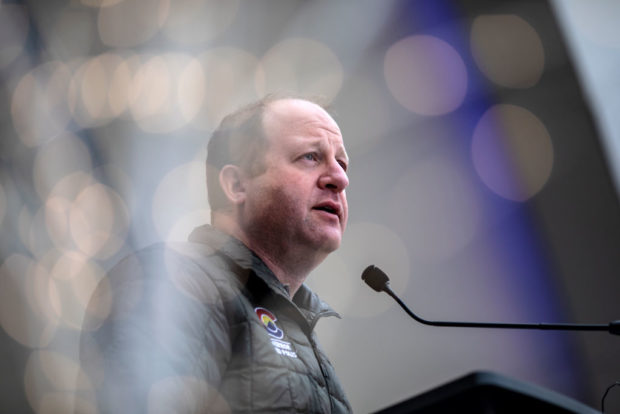A federal judge in Colorado blocked a state law that would limit the sale of guns, arguing it violates the Supreme Court precedent.
Chief Judge for the U.S. District of Colorado Phillip Brimmer issued a preliminary injunction Monday that the law known as Senate Bill 169, which took effect Monday, could not be enforced because it violates the precedent established in the 2022 Supreme Court case Bruen v. New York Rifle & Pistol Association.
Rocky Mountain Gun Owners challenged the law, which raised the legal age to purchase a gun to 21 and created a three-day waiting period for firearm purchases. Brimmer did not rule on the waiting period portion, which is slated to go into effect in October.
“Bruen states that the Court has ‘made clear that individual rights enumerated in the Bill of Rights and made applicable against the States through the Fourteenth Amendment have the same scope as against the Federal Government,'” Brimmer wrote.

BOULDER, CO – MARCH 22: Colorado Governor Jared Polis speaks at a day of remembrance event on March 22, 2022 in Boulder, Colorado. (Photo by Chet Strange/Getty Images)
Brimmer added the state did not provide evidence that the ban of gun sales is “consistent with the right to bear arms.” (RELATED: Federal Appeals Court Finds ATF Pistol Brace Rule Is Likely Unlawful: ‘Impossible For A Regular Citizen’)
“The Governor argues that the Individual Plaintiffs have made an insufficient showing that the right to keep arms includes a right to buy firearms,” the ruling read.
“[Gov. Polis] failed to meet his burden to demonstrate that SB23-169 is consistent with the Nation’s historical tradition of firearms regulation.” Brimmer continued.
The Supreme Court ruled in Bruen that New York’s concealed carry law, which allowed applicants be denied a permit if they did not show a “special need” was unconstitutional. The court ruled 6-3 that the “proper-cause requirement violates the Fourteenth Amendment by preventing law-abiding citizens with ordinary self-defense needs from exercising their Second Amendment right to keep and bear arms in public for self-defense.”
“The constitutional right to bear arms in public for self-defense is not ‘a second-class right, subject to an entirely different body of rules than the other Bill of Rights guarantees,’” the court ruled. “The exercise of other constitutional rights does not require individuals to demonstrate to government officers some special need.”


